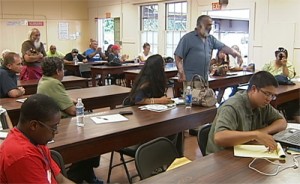HILO, Hawaii: The disproportionate number of Native Hawaiians who are in prison in Hawai’i and the U.S. mainland gave rise to passionate voices in Hilo on Saturday.
Anger, tears, and prayer… a wide range of responses from a community that remains disturbed by an Office of Hawaiian Affairs report issued in 2010 entitled: “The Disparate Treatment of Native Hawaiians in the Criminal Justice System.”
Thats why the 2012 Native Hawaiian Justice Task Force was on the Big Island. The team is holding a series of meetings aimed at identifying and supporting comprehensive solutions to this nagging issue.
We spoke to task force member – and OHA CEO – Dr. Kamana’opono Crabbe about their mission.
The meetings follow a two-day summit in June at the Hawaiʻi State Capitol in Honolulu, where members of the newly-created task force began using their collective reach and access to engage policymakers and others in addressing the issue.
According to the document, Native Hawaiians make up 24 percent of the general population of Hawai‘i, but 27 percent of all arrests, 33 percent of people in pretrial detention, 29 percent of people sentenced to probation, 36 percent admitted to prison in 2009, 39 percent of the incarcerated population, 39 percent of releases on parole, and 41 percent of parole revocations.
The numbers are more than statistics for those who testified on Saturday.
Another disturbing finding in the report: Native Hawaiians make up the highest percentage of people incarcerated in out-of-state facilities.
The report says that in 2005, of the 6,092 people who were under the custody of Hawaii’s Department of Public Safety, which includes people in jails, 29 percent (or 1,780) were in facilities operated by other states or private companies on behalf of states. Of the people in out of state facilities, 41 percent are Native Hawaiians.
Things got especially passionate when Hilo resident Tom Anthony – an advocate for the Hawaiian Kingdom – lashed out at task force chair Michael Broderick, demonstrating the rift between the authorities and the people when it comes to the justice system.
But some came to the meeting with solutions. Sam Kaleleiki has been pushing for a puuhonua at the former Kulani prison for years, and he has had success this year at the state legislature. The governor signed Bill 2848 into law in June. Uncle Sam was happy with the news a few weeks ago during this benefit for his organization, Ohana ho’opakele, at Makuu Farmers Market in Puna… but he remains skeptical.
Could the puuhonua work? After all, the OHA’s 2010 report found that “culturally inappropriate or unavailable re-entry services are not as effective for helping Native Hawaiians achieve successful life outcomes and stay out of prison.”


by Big Island Video News5:03 pm
on at
STORY SUMMARY
HILO, Hawaii: The disproportionate number of Native Hawaiians who are in prison in Hawai’i and the U.S. mainland gave rise to passionate voices in Hilo on Saturday. Anger, tears, and prayer… a wide range of responses from a community that remains disturbed by an Office of Hawaiian Affairs report issued in 2010 entitled: “The Disparate […]